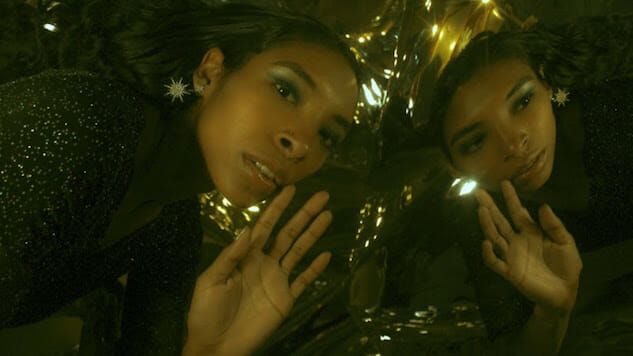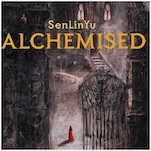The 10 Best Albums of February 2019
Photo by Catalina Xavlena
Welcome to end-of-the-month coverage at Paste dot com where we’ve determined winter is long, February is short and music is still good. This brief month once again made good on the promise of lots of great new tunes in a short amount of time, bringing us superb new records from Texas, Australia and beyond. From the Lone Star State, Robert Ellis released his flashy flirtation with the keys, Texas Piano Man, and Ryan Bingham returned with his first studio album in four years, American Love Song. Aussie singer/songwriter Julia Jacklin offered up a breakup album for the ages in the form of Crushing, and California experimentalist Chrystia Cabral shared her second album as SPELLING, the transportive Mazy Fly. Emily King dazzled on her enchanting LP Scenery, and French composer Yann Tiersen escaped to nature’s most tempting nether-regions on the elusive ALL. All that and more is gathered below. So without any further fuss, here are the best albums of the month—alternatively, 10 artists you can listen to instead of Ryan Adams.
Here are the 10 best albums of February, according to Paste’s music critics:
10. Robert Ellis: Texas Piano Man
Rating 7.7
It’s funny that Robert Ellis’ new album Texas Piano Man was released on Valentine’s Day. While there are a good number of love songs on the record, it’s alarmingly disillusioned, not the idealized stuff of greeting cards and romantic comedies. There’s a cheeky examination of bickering in “Aren’t We Supposed To Be In Love,” acts of longing and desperation on “When You’re Away” and a seemingly funny tune about a “Passive Aggressive” partner that’s actually kind of sad. “That’s one way to communicate,” Ellis sings. “I wish you would just give it to me straight”—not exactly the doe-eyed love song you’re after on Feb. 14. The relationships on this dazzling album are far from perfect, but they’re honest, and the multi-talented Ellis, coming off a string of breakup records, sounds more comfortable in his skin than ever before. And then again, the Valentine’s Day release date is perfect. On the nostalgic “Nobody Smokes Anymore,” a prickly pining for the good ol’ days, Ellis unleashes an audible smooch. “No one has fun anymore,” he sings, like a hyped up Harry Nilsson. “Everybody’s so stressed out.” Texas Piano Man is exactly what it sounds like: a cross between country-blues and piano-pop. Ellis surely knows his way around the keys, and his fifth studio album is funny, frank and alive. It’s a storyful, self-realized album that also happens to be a hell-of-a good time to listen to. —Ellen Johnson
9. Ryan Bingham: American Love Song
Rating 7.7
Even as a relatively young man, Ryan Bingham came across as an old soul. At age 17, he hitchhiked to Laredo to join his divorced dad, and from that point on, he spent his time drinking beer, becoming a rodeo rider and eventually making his way to France where he busked in Paris parks. Returning to Texas, he made a pair of self-released records, gained a major label deal and helped score the soundtrack to the film Crazy Heart, including co-writing the song “The Weary Kind,” which garnered him an Academy Award, a Grammy and the Americana Music Association nod for Artist of the Year as a result. Whew. That’s a pretty impressive list of accomplishments. It also sets a high bar. Fittingly then, American Love Song, Bingham’s first studio album in four years, finds him maintaining quality control. At the same time, it’s also frayed around the edges, rather loosely constructed, and just as ragged as it is raucous. The one-two-three punch of the first three tracks—a raging “Jingle and Go,” followed by the stomp and surge of “Nothin’ Holds Me Down” and the blazing Stones-like rocker “Pontiac”—find Bingham vetting his defiance before settling down in relatively subdued terrain. Ragged ballads “Beautiful and Kind,” “What Would I’ve Become,” “Blue,” “Stones” and “America” find him croaking in a weary rasp, the ache in his voice all too palatable. An occasional blues—“Hot House” and “Got Damn Blues”—find him taking a similar stance with songs that sound of a vintage variety and far more ancient than his own 37 years. —Lee Zimmerman
8. Yak: Pursuit of Momentary Happiness
Rating 7.8
Yak’s 2016 debut LP Alas Salvation had a deranged energy that was always going to be hard to recapture, but their 2019 follow-up Pursuit of Momentary Happiness comes pretty darn close. While Pursuit of Momentary Happiness might not be as satisfying of an overall listening experience as Alas Salvation, it’s a more intense and varied tracklist. Tracks like “Bellyache” and “Fried,” see frontman Oli Burslem fighting animalistic urges with every ounce of energy he can muster. It’s the kind of paranoid, blowtorched sound with a wide eyed-conviction that puts them somewhere on the border of unrelenting proto-punk and snarling Stones-y rock. On “Encore,” Burslem sings, “With no conviction / Everything will ultimately / Roll back on itself,” and lucky for him, the band possesses such believable conviction. What’s most surprising is that the album’s self-deprecating lyrical introspectiveness reaches the same level of emotional intensity as their bursts of scorching rock ‘n’ roll. Pursuit of Momentary Happiness isn’t as consistent as its predecessor, but its moments of punk gusto find Yak at their mightiest peak. —Lizzie Manno
7. Rustin Man: Drift Code
Rating 7.9
Depending on the song, and even on the verse, Rustin Man’s Paul Webb either sounds like an Appalachian mountain man singing through diastema or David Bowie, not the combination anyone might expect but surprisingly the combination we all deserve. The idiosyncratic aural read on Webb’s new album, Drift Code, arriving a staggering 17 years after Out of Season, his 2002 collaboration with Beth Gibbons, is key to its spirit. His music feels right at home both on Earth and in outer space, an ode to British folk washed in reverb and wrapped in cosmic peculiarities. Drifting is the record’s bread and butter, maybe even its mission statement, couched right in its title. Start to finish, Drift Code encapsulates a journey unto itself, a tad overlong even at a scant nine tracks—“All Summer,” the capper, while lovely, feels extraneous to the function of the album—but worthy all the same for sheer innovation. Old as Webb’s references, intended or not, are, they metastasize into a singular work. Disparate as its identity appears on first listen, it’s surprisingly cogent on a second run through. Drift Code’s mesmeric powers take time and patience for best effect to settle in, which might be a big ask for an investment clocking in at a half an hour and change. But what Webb has created is so rich, so delightfully off-kilter, that an auxiliary listen is necessary the same way another sip of pickleback is necessary. —Andy Crump
6. Emily King: Scenery
Rating 8.2
The kudos Emily King has accumulated in her career qualifies her for star status. It’s an impressive list, one that includes a 2007 Grammy nomination for Best Contemporary R&B Album and, in 2012, the Holly Prize honors for songwriting. Still, as her shimmery sound suggests, she leans more on subtlety and nuance rather than the kind of flash that generally draws attention these days. Three albums on, she’s honed a blend of subtlety and sensuality to create a style that’s often as elusive as it is enchanting. Granted, that description does suggest a certain contradiction, and indeed, King’s hushed vocals are clearly a counterpoint to the propulsive rhythms that underscore the songs. It’s an ideal yin and yang: “Blue Light,” “Forgiveness” and “Remind Me” create a kind of tension between her tactile singing and the buoyancy of her melodies. It’s worth noting that King composes all her own songs, and Scenery, her third full-length, reflects a marked maturity. The vulnerability that’s implied in King’s calming vocal caress is remarkable in a way, especially when compared to the brazenness that accompanies much of what seems to pass for pop music these days. The skill she shows elevates her above much of the competition, imbuing her with a decided level of class and credence. King wears that crown well. — Lee Zimmerman
5. SPELLING: Mazy Fly
Rating 8.2
Sometimes too much backstory is distracting. It’s easy to get lost in the maze of Tia Cabral’s inspirations and touchstones for Mazy Fly, her new album as SPELLLING, but it’s just as easy—and far more transporting—to simply get lost in the music. That’s not to say her inspirations don’t matter: from a lightness of spirit Cabral felt while watching her dog run around to meditations on the effects of technology, the wonder of flight and the horrors of Middle Passage slave ships, Mazy Fly is densely packed with ideas and images. The music, on the other hand, isn’t dense at all. These dozen songs are at once spacious and intimate, with plenty of room for elements to seep into Cabral’s arrangements and then recede again. For such varied subject matter—wrenching historical memory to buoyant afrofuturism—Mazy Fly is a remarkably cohesive collection of songs. Cabral has constructed a whole world through her music. It’s as much an interior environment mirroring her own distinctive viewpoint as it is a reflection on the outside world, but that ends up being one of the album’s strengths. Mazy Fly is idiosyncratic, but in a thoughtful and imaginative way that is too appealing to resist. —Eric R. Danton
4. Yann Tiersen: ALL
Rating 8.3
Like almost everything in this world, music tends to be categorized and confined to a specific niche. It could be rock, rap, blues, country or R&B, but once it has its label, then the chances are that it will be locked into it going forward. On the other hand, when an artist like Yann Tiersen comes along, it’s best to dig a bit deeper. ALL, the French-bred artist’s ninth album to date, is, like his earlier outings, similar in sound to a soundtrack that would accompany a documentary on the Discovery Channel, although in truth, it’s simply the manifestation of Tiersen’s love of the environs of Eusa, the island where he lives and records. His connection to nature provides the album’s central theme, and while the lyrics, such as they are, are sung in languages other than English, the meditative mood provides a tranquil tapestry throughout, all expressed within a mellow and melodic afterglow. Ultimately, categories don’t really matter much, given the fact that these soothing and assuring tones provide an oft-needed respite from the onerous onslaught of today’s mostly dire and distressing news. Escapism is increasingly needed in these turbulent times, and with ALL, that remedy is realized. —Lee Zimmerman
3. The Claypool Lennon Delirium: South Of Reality
Rating 8.5
Hearing two musicians of distinct sounds play to their sensibilities under one banner, all the while avoiding cross-fertilization between their father projects, is an awesome thing. Les Claypool, bass god, rebel, and inveterate eccentric, and Sean Lennon, methodical, pop folk musician, and, yes, child of John Lennon and Yoko Ono, have very pronounced personalities. On paper those personalities clash; on the records they’ve made together under the banner of The Claypool Lennon Delirium, 2016’s Monolith of Phobos and now their latest, South of Reality, they harmonize. The music treads away from self-seriousness; neither Claypool nor Lennon could be called businesslike or humorless. Everything they do, they do tongue firmly in cheek. At the same time, they have big ideas, and those big ideas demand articulation through music on an equally big scale. South of Reality has that scale. It’s also idiosyncratic to an extent that makes gauging it akin to a carnival ride. There’s showmanship to The Claypool Lennon Delirium, which, given the veteran talent of its chief members, is unavoidable; their union can only lead to high caliber art. But it’s challenging music, especially for newcomers to their sound. What makes the challenge rewarding is the elasticity of their work, giving the record a sense of scope that underpins the gonzo array of aesthetics they’ve sewn together here. South of Reality, ultimately, is a great album, but more importantly, it’s a great adventure. —Andy Crump
2. Julia Jacklin: Crushing
Rating 8.6
Autonomy can be damn frightening. The realization—the one arriving after a breakup, before a solo move, following a graduation, etc.—that you’re actually in this thing alone and only you are in the driver’s seat can leave you feeling scared silly. Or it can leave you feeling high on independence. Julia Jacklin’s Crushing is a striking search for self, a call to upend that which tethers you down. But it’s also rooted, deeply, in a sense of calm. The Aussie songwriter’s ability to process emotion is out-of-this-world sharp, and this album is her best, most piercing work to date. Crushing can change from melodic balladry to anthemic rock at the drop of a hat. And for its entirety, Jacklin, slowly gaining cred as one of the most underrated singer/songwriters working, basks in a newfound clarity. Crushing is the brave story of a woman—and an artist —coming into her own. Securing that agency, however, was no walk in the park. Jacklin clearly had to sort through mountains of wreckage to arrive here, but the album’s autobiographical nature is what makes it so affecting. Jacklin said, in writing it, she realized “how not very special” she is (evident in “Body,” as she sings, “It’s just my body / I guess it’s just my life”). But in recognizing the non-exclusivity of her experiences, she made something singular. —Ellen Johnson
1. Bob Mould: Sunshine Rock
Rating 9.4
What good did we, as a society, do to deserve Bob Mould? He is a Good and Pure genius, who touches down every so often and blesses us with a new album—in this case, Sunshine Rock—before going back to whatever loud and magical land he occupies. He is like a favorite uncle, occasionally forgotten in the daily grind but always welcomed with a sense of “Why am I not listening to this every single day?” Mould doesn’t waste any time getting right to the title track, and it’s an aching love song in the vein of Sugar’s “Your Favorite Thing.” Mould’s guitar pounds like a heart wrapped in barb wire, offering, pleading for the object of his affection to come away on an adventure. Mould is at his best when he’s begging, making you wonder who could possibly say no to the promise “I’ll be your astronaut.” Mould is the man we need right now. Sunshine Rock is bitter and hopeful, full of rage and promise. It’s an album that defines a moment in all its ugliness and the rare moments of beauty that we have to keep fighting for. “You can’t predict the future, you can’t forget the past,” he sings on “Camp Sunshine.” So maybe we can’t go back there. But we can make our own sunshine in our own little corners. We can all be someone’s astronaut. —Libby Cudmore







































